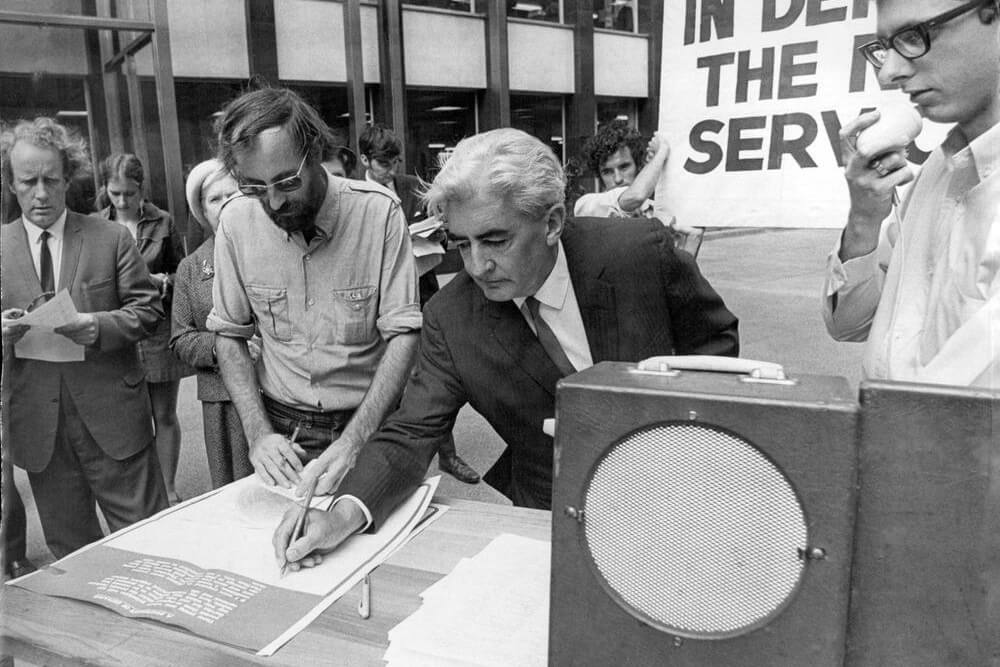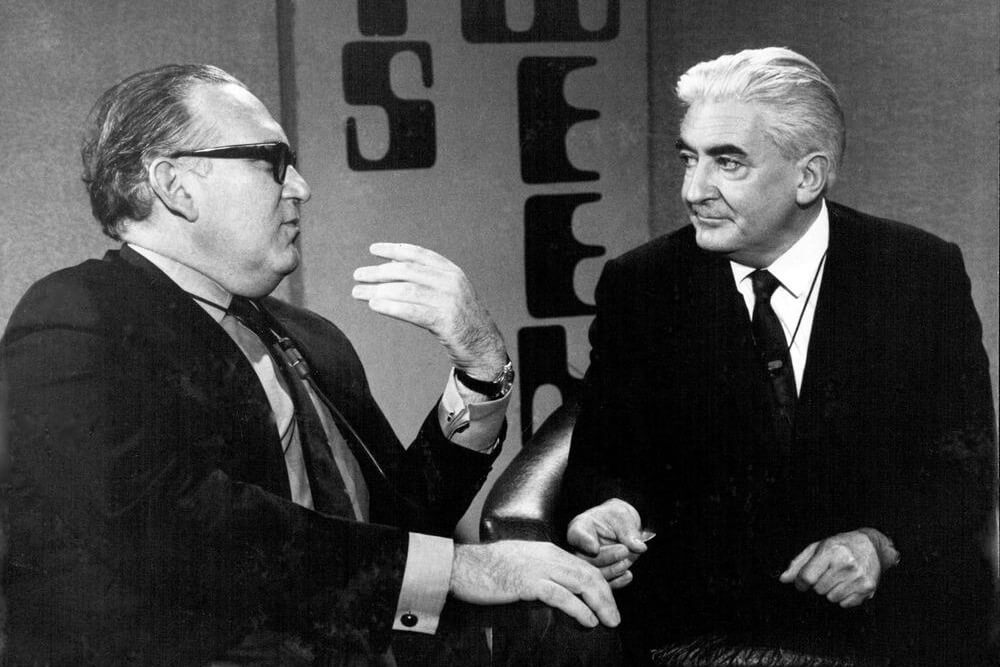Location
Murrumburrah-Harden Historical Society Museum, 302–304 Albury Street, Harden NSW 2587
Harden is on the land of the Wiradjuri and Ngunnawal People.
Accessibility
Wheelchair accessible
About Ken Thomas
Kenneth William Thomas (1913–1997) was an innovator in trucking, fleet transport, logistics and shipping who founded the freight giant TNT. A titan of industry, Ken understood the importance of rail in Australia, integrating his road operations with the railways, spearheading the adoption of shipping containers.
Beyond transportation and being an advocate for road safety, Ken was also a strong anti-war activist and anti-conscriptionist. His work had a dramatic effect on regional Australia and Australian exports, while his road safety campaigns saved countless Australian lives.
Early years in the twin towns
Ken Thomas was born in 1913 in the twin towns of Harden–Murrumburrah in the Hilltops region of New South Wales. He was the fifth of 6 sons of engine driver Arthur Picton Thomas and his wife Elizabeth McLeod. The family lived in Harden until 1924, when they moved to Sydney.
Graduating from the University of Sydney, Ken worked as a schoolteacher, station hand, salesman and shop assistant. As a lay Presbyterian preacher from the age of 18, Ken was a self-declared pacifist at the outset of the Second World War. Instead of enlisting for the war, he made himself available to the Commonwealth Manpower Directorate and worked in munition production and meatworks across Australia.
From little things big things grow
On his return to Sydney after the war in 1946, Ken recognised the lucrative potential in hauling timber, purchasing a 5-tonne truck for local and later interstate haulage. By the end of 1948, Ken had left his full-time job as a survey officer at Cumberland County Council and acquired 3 tabletop trucks and a semi-trailer.
As his business grew, Ken became active in the formation of the Long Distance Road Transport Association and the National Freight Forwarders Association. He developed the freight note and invoicing system which is still in use today, simplifying the process by consolidating cargo costs, haulage charges and cargo destination information into a single document.
In 1951, Ken registered KW Thomas Transport Pty Ltd and expanded his business across the country, taking advantage of developments such as diesel locomotives on the rail network to develop a rail-based freight network. In 1962, he registered his company on the Australian Stock Exchange as Thomas Nationwide Transport Ltd (TNT) and expanded into integrated rail, road haulage, sea freight and bulk shipping across the Tasman. TNT entered the North American market after acquiring the logistics company Kwikasair.
Battling against conscription
Outspoken on political and social matters, Ken joined forces with his business rival, Gordon Barton, in November 1966. Together, they established the Liberal Reform Group to oppose conscription and promote an independent foreign policy platform in response to Australia's involvement with the Vietnam War.
Ken ran unsuccessfully for the Senate in 1967, and in 1969 founded the Australian Movement to Abolish Conscription for Overseas Service and the Australian Peace Institute. He became chairman of the Committee in Defiance of the National Service Act, a group formed to oppose conscription. Members encouraged 20-year-olds to refuse to register under the National Service Act, which was an offence at the time. Ken was prosecuted and (unsuccessfully) demanded to be jailed alongside other conscientious objectors.
The end of the road at TNT
An early advocate of driver welfare, Ken established stopping-off points where drivers could sleep, eat, carry out repairs and refuel. Before this, drivers often had to sleep in their trucks as they struggled to find overnight accommodation. Ken was also a generous employer, providing TNT staff with bonuses, profit-sharing and share-purchase schemes.
In 1972, as TNT attempted to take over Ansett Transport Industries, the TNT Board forced Ken to resign as chairman due to comments he made to university students about religion. Ken remained bitter about this dispute for many years, feeling that long-term colleagues and members of the board had abandoned him. Investing in other business ventures, Ken unfortunately did not attain the same level of success as with TNT, leading to substantial financial losses.
Making our roads safer
A long campaigner for safer roads throughout his career, Ken was influential in the campaign to make seatbelt-wearing compulsory in New South Wales in 1971. He later established the Save a Life a Day group in 1979 with the aim of reducing road fatalities. The group lobbied the NSW Government to implement compulsory licence suspension and jail sentences for drink-driving offences.
Advocating for improved road safety measures, Ken ran as an independent candidate in the 1981 state election but was unsuccessful.
A lasting influence
Ken died in Orange in 1997 and was inducted into the Shell Rimula Wall of Fame in 2012 at the National Road Transport Hall of Fame in Alice Springs. Revolutionising freight in Australia, Ken's integrated transport model had significant influence in the second half of the 20th century, while his road safety campaigns helped make Australian roads safer for all.
References and further reading
- Everingham SG (2022) Kenneth William (Ken) Thomas (1913–1997), Australian Dictionary of Biography, Australian National University website, accessed 25 June 2025.
- National Road Transport Museum (2012) Ken Thomas, National Road Transport Hall of Fame website, accessed 25 June 2025.
- Twin Town Times (3 June 2015) Historic local legend Ken Thomas, Part 2, Twin Town Times website, accessed 31 Jan 2024.
- Twin Town Times (28 May 2015) Historic local legend Ken Thomas, founder of TNT, Twin Town Times website, accessed 31 Jan 2024.
- Wilcox D A (2016) The truckie who loved trains: the biography of Ken Thomas, founder of Thomas Nationwide Transport, Trove website, accessed 25 June 2025.



